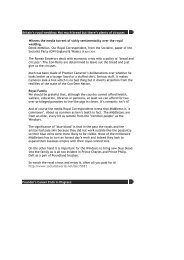New meanings of Panafricanism in the era of globalisation
New meanings of Panafricanism in the era of globalisation
New meanings of Panafricanism in the era of globalisation
You also want an ePaper? Increase the reach of your titles
YUMPU automatically turns print PDFs into web optimized ePapers that Google loves.
President Thabo Mbeki, <strong>in</strong> his capacity as <strong>the</strong> leader <strong>of</strong> <strong>the</strong> Republic <strong>of</strong> South Africa and<br />
as one <strong>of</strong> <strong>the</strong> foremost statespersons on <strong>the</strong> African cont<strong>in</strong>ent, has sent out many signals<br />
and explicit statements that he <strong>in</strong>tends, toge<strong>the</strong>r with likem<strong>in</strong>ded men and women <strong>in</strong> <strong>the</strong><br />
leadership <strong>of</strong> o<strong>the</strong>r African states, to remake <strong>the</strong> image and <strong>the</strong> substance <strong>of</strong> <strong>the</strong> cont<strong>in</strong>ent<br />
and <strong>of</strong> its peoples. Although he entered <strong>the</strong> <strong>in</strong>ternational public limelight with a<br />
reputation as a realistic and pragmatic communist, it is clear that, s<strong>in</strong>ce at least 1996, and<br />
probably even earlier, he has very delib<strong>era</strong>tely been pr<strong>of</strong>il<strong>in</strong>g himself as a Panafricanist,<br />
one who is conscious <strong>of</strong> <strong>the</strong> lowly position which <strong>the</strong> cont<strong>in</strong>ent <strong>of</strong> Africa occupies <strong>in</strong> <strong>the</strong><br />
global peck<strong>in</strong>g order. He is, like many o<strong>the</strong>rs before him, especially s<strong>in</strong>ce Kwame<br />
Nkrumah first gave notice to <strong>the</strong> world that Africans were go<strong>in</strong>g to take back <strong>the</strong>ir<br />
cont<strong>in</strong>ent and make it <strong>in</strong>to an <strong>in</strong>tegral part <strong>of</strong> <strong>the</strong> progressive civilisation <strong>of</strong> <strong>the</strong> end <strong>of</strong> <strong>the</strong><br />
2 nd millennium, attempt<strong>in</strong>g to awake <strong>the</strong> “sleep<strong>in</strong>g giant” and to make it possible for<br />
Africans on <strong>the</strong> cont<strong>in</strong>ent and <strong>in</strong> <strong>the</strong> diaspora to escape from <strong>the</strong> legendary curse <strong>of</strong> Ham.<br />
This vision and this trajectory are <strong>in</strong> <strong>the</strong>mselves not remarkable at all. Any black person<br />
and especially any African who believes that s/he has access to <strong>the</strong> human and material<br />
resources to launch a campaign, or better, a chimurenga, for <strong>the</strong> total lib<strong>era</strong>tion <strong>of</strong> <strong>the</strong><br />
peoples <strong>of</strong> <strong>the</strong> cont<strong>in</strong>ent would experience <strong>the</strong> moral-political compulsion to make such<br />
an attempt. What is remarkable, however, is <strong>the</strong> political-economy frame <strong>of</strong> reference<br />
that apparently <strong>in</strong>forms <strong>the</strong> chosen strategy by which Mbeki and his colleagues hope to<br />
br<strong>in</strong>g about <strong>the</strong> desired end. This is, stated crudely, no less and no more than <strong>the</strong><br />
extension to <strong>the</strong> entire cont<strong>in</strong>ent, through <strong>the</strong> promotion <strong>of</strong> NEPAD, <strong>of</strong> <strong>the</strong> pr<strong>in</strong>ciples and<br />
<strong>the</strong> economic assumptions underly<strong>in</strong>g <strong>the</strong> policy <strong>of</strong> GEAR, i.e., <strong>the</strong> Growth, Employment<br />
and Redistribution strategy, adopted to <strong>the</strong> surprise <strong>of</strong> most people by <strong>the</strong> South African<br />
rul<strong>in</strong>g party <strong>in</strong> June 1996. By way <strong>of</strong> what one can only call <strong>the</strong> sweeten<strong>in</strong>g <strong>of</strong> <strong>the</strong> bitter<br />
pill <strong>of</strong> neolib<strong>era</strong>l economics 2 , Mbeki and his followers have also preached a so-called<br />
African renaissance and have managed <strong>in</strong> a few short years, toge<strong>the</strong>r with o<strong>the</strong>r forwardlook<strong>in</strong>g<br />
African leaders, to reconfigure <strong>the</strong> Organisation <strong>of</strong> African Unity as <strong>the</strong> African<br />
2 Accord<strong>in</strong>g to Mbeki, “… (<strong>the</strong>) rationale beh<strong>in</strong>d our macro policy is based on <strong>the</strong> simple reason (sic) that<br />
we believe that macroeconomic stability is a precondition for economic growth and development. Fiscal<br />
discipl<strong>in</strong>e and curtail<strong>in</strong>g <strong>in</strong>flation are necessary to restore confidence and create <strong>the</strong> basic environment<br />
with<strong>in</strong> which growth can occur”. (Cited <strong>in</strong> Marais 2002:90)<br />
2
















